Do French Bulldogs have lots of health problems?
Those adorable little bundles of joy that steal our hearts with their playful antics and irresistible charm. But behind those cute faces lies a breed that has unfortunately earned a reputation for health problems. In this exposé, we’re diving deep into the perplexing world of French Bulldog health issues, separating fact from fiction and shedding light on the truth.
These Molossian darlings may seem invincible, but their compact bodies and unique physical features make them susceptible to a laundry list of potential ailments. From brachycephalic respiratory syndrome to pesky skin allergies, French Bulldogs face a set of challenges that demand attention from breeders and owners alike.
So why are French Bulldogs more prone to these health problems? Well, it turns out that irresponsible breeding practices have inadvertently led to a slew of congenital conditions. Elongated soft palates, narrow nostrils, and wonky tracheas are just some of the issues these lovable canines contend with. As a result, they often struggle with breathing difficulties, making them more susceptible to heat exhaustion and unable to keep up during playtime.
And let’s not forget about those iconic bat-like ears that make us swoon. While they may be cute as can be, they also provide the perfect environment for ear infections to thrive. And those expressive faces? They’re no strangers to eye problems like cataracts and corneal ulcers. Joint and bone disorders like hip dysplasia and intervertebral disc disease also plague these pups, causing chronic pain and mobility issues.
But before you start panicking about your furry friend’s health prospects, let’s debunk some misconceptions about French Bulldogs. Not every Frenchie is destined for a life filled with severe health issues. Responsible breeding practices, regular check-ups at the vet’s office, a balanced diet, and exercise can go a long way in mitigating these risks. Plus, with advancements in veterinary medicine and a better understanding of breed-specific health challenges, many French Bulldogs live happy and fulfilling lives.
In this blog series, we’ll delve into the nitty-gritty of French Bulldog health. We’ll explore preventative measures, potential treatments, and the latest research breakthroughs related to specific ailments. Whether you’re a devoted French Bulldog owner, a breeder looking for guidance, or just someone fascinated by canine health, join us on this informative journey

What Is Brachycephalic Airway Syndrome?
Contents
- 1 What Is Brachycephalic Airway Syndrome?
- 2 How Can Skin Allergies and Infections Affect French Bulldogs?
- 3 Common Eye Issues in French Bulldogs
- 4 Orthopedic Concerns for French Bulldogs
- 5 Gastrointestinal Problems in French Bulldogs
- 6 Genetic Conditions in French Bulldogs
- 7 Prevention and Management Strategies for French Bulldog Health Issues
- 8 Tips for Ensuring Optimal Health in Your French Bulldog
- 9 Conclusion
Brachycephalic Airway Syndrome refers to a combination of anatomical abnormalities in the upper airway of brachycephalic breeds. These abnormalities include a shortened skull shape, elongated soft palate, narrow nostrils, and other soft tissue obstructions.
Together, these factors hinder proper air flow and make breathing difficult for affected dogs.
Understanding the Anatomy:
Brachycephalic breeds like French Bulldogs have a unique skull structure that is compressed from front to back, resulting in a shorter nasal passage and narrower airway. This restricted airflow can be further exacerbated by an elongated soft palate at the back of the throat and narrow nostrils, making it challenging for these dogs to breathe comfortably.
Symptoms and Challenges:
Dogs with Brachycephalic Airway Syndrome often exhibit symptoms such as noisy breathing, excessive panting, snoring, and difficulty exercising or playing for extended periods. These issues can be particularly pronounced during hot weather or strenuous physical activity when dogs struggle to cool themselves down efficiently.
The Importance of Veterinary Care:
Regular veterinary check-ups are crucial for brachycephalic breeds like French Bulldogs to monitor their respiratory health and identify any potential issues early on. Veterinarians may recommend various treatments, including surgical procedures such as soft palate resection or widening of the nostrils, to alleviate breathing difficulties.
Preventive Measures:
While Brachycephalic Airway Syndrome is primarily a structural issue, there are steps owners can take to improve their dog’s quality of life. Providing a well-balanced diet, maintaining a healthy weight, and avoiding excessive heat or exercise can help reduce the severity of symptoms. Additionally, proper grooming and regular cleaning of wrinkles and folds can minimize the risk of skin infections.
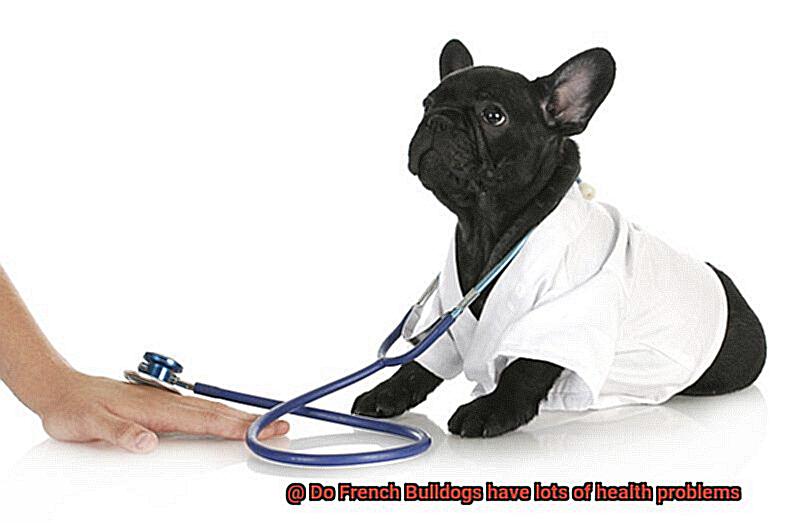
Conclusion:
Brachycephalic Airway Syndrome is a significant health concern for French Bulldogs and other brachycephalic breeds. By understanding the anatomical abnormalities that contribute to this syndrome and taking appropriate preventive measures, owners can ensure their furry companions enjoy a happy and healthy life. Remember, regular veterinary care and responsible ownership are key to managing this condition effectively.
How Can Skin Allergies and Infections Affect French Bulldogs?
It’s essential to understand how these pesky skin issues can affect our furry friends so that we can provide them with the proper care they deserve. In this blog post, we’ll dive into the world of French Bulldog skin troubles, exploring the common problems they face and how to tackle them head-on.
Allergic Dermatitis: When Allergies Go Haywire

Allergic dermatitis is a frequent skin problem faced by French Bulldogs. It occurs when their immune system goes into overdrive, reacting to allergens like pollen, dust mites, or certain foods. The result? Intense itching, redness, inflammation, and hair loss that can leave your Frenchie feeling utterly miserable. We’ll discuss ways to identify and avoid triggers while soothing their irritated skin.
Pyoderma: Battling Bacterial Skin Infections
The folds and wrinkles on a French Bulldog’s face and body may look cute, but they can become a breeding ground for bacteria if not properly maintained. Pyoderma, a bacterial skin infection, can cause redness, pustules, and oozing sores that can make your Frenchie feel less than fabulous. We’ll share grooming tips and hygiene practices to keep these infections at bay.

Yeast Infections: A Fungal Fiasco
Warm and moist environments created by the folds in their skin make French Bulldogs particularly susceptible to yeast infections. These pesky fungi can cause itching, redness, odor, and discharge that will have your Frenchie scratching their head (quite literally.). Discover effective ways to prevent and treat these stubborn infections.
Grooming and Hygiene: The Key to Healthy Skin
Regular grooming and hygiene practices are essential for French Bulldogs. We’ll provide a handy checklist, including bathing with hypoallergenic shampoos, drying those adorable folds thoroughly, and keeping their ears squeaky clean. These simple steps can go a long way in preventing skin issues.
Seeking Veterinary Care: When All Else Fails
Sometimes, despite our best efforts, skin allergies and infections persist or worsen. That’s when it’s time to seek veterinary care. We’ll explore the various treatment options available, from medicated shampoos to oral medications and allergy testing. Remember, your veterinarian is your ally in helping your Frenchie find relief.
Common Eye Issues in French Bulldogs
French Bulldogs are adorable and lovable companions, but their unique facial structure and large, prominent eyes make them prone to several eye issues. As a proud Frenchie parent, it’s important to be aware of these common eye problems and the available treatments. In this blog post, we’ll explore the most frequent eye issues in French Bulldogs and provide insights on how to keep their precious peepers healthy and happy.
Cherry Eye:
One of the most common eye problems in French Bulldogs is cherry eye. This occurs when the tear gland in the eye becomes inflamed and protrudes from the corner of the eye, resembling a small red cherry. Cherry eye can cause discomfort and may require surgical correction by a veterinarian to restore normal function.
Dry Eye (Keratoconjunctivitis Sicca):
Dry eye is another prevalent condition among French Bulldogs. It happens when the eyes do not produce enough tears to keep them lubricated, leading to dryness, irritation, and potential corneal damage. Treatment typically involves using artificial tears or medication to stimulate tear production and alleviate symptoms.
Corneal Ulcers:
French Bulldogs are prone to corneal ulcers, which are open sores on the surface of the cornea. These ulcers can occur due to trauma, foreign objects, or underlying eye conditions. Immediate veterinary attention is crucial to prevent complications and promote healing.
Progressive Retinal Atrophy (PRA):
PRA is a genetic condition that affects the retina of the eye and can lead to progressive vision loss in French Bulldogs. Regular eye examinations are essential to detect early signs of PRA so that appropriate management strategies can be implemented.
Other Eye Issues:
French Bulldogs may also experience entropion (inward rolling of the eyelids), ectropion (outward rolling of the eyelids), and cataracts (clouding of the lens). These conditions can cause discomfort, vision impairment, and may require surgical intervention.
Conclusion:
As responsible Frenchie parents, it’s crucial to be proactive in caring for our furry friends’ eye health. Regular grooming, avoiding exposure to irritants, and seeking veterinary attention at the first sign of abnormal symptoms or changes are paramount. By being knowledgeable about common eye issues in French Bulldogs and taking appropriate preventive measures, we can ensure that our beloved companions enjoy a lifetime of clear and healthy vision.
Remember, your French Bulldog’s eyes are windows to their soul, so let’s keep those peepers bright and beautiful.
Orthopedic Concerns for French Bulldogs
“French Bulldogs and Their Wobbly Bones: Orthopedic Concerns You Need to Know.”
Hey there, fellow French Bulldog enthusiasts. Today, we’re diving deep into a topic that affects our beloved squish-faced friends: orthopedic concerns. These little bundles of joy are prone to a few skeletal and joint problems that can cause some serious discomfort. But fear not. We’re here to equip you with the knowledge you need to keep your Frenchie strutting their stuff pain-free.
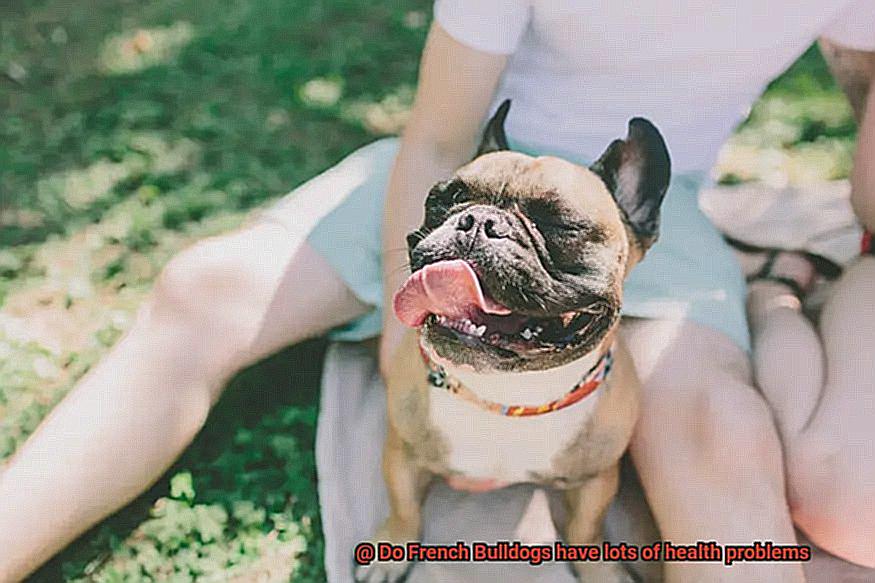
Hip Dysplasia: A Real Pain in the Rump.
First up, let’s talk about hip dysplasia. This common condition occurs when the hip joint doesn’t develop properly, leading to poor fit between the femur and the hip socket. Ouch. Symptoms include lameness, difficulty walking or running, and general discomfort. So, be sure to watch out for any signs of hip dysplasia and consult your vet for proper diagnosis and treatment options.
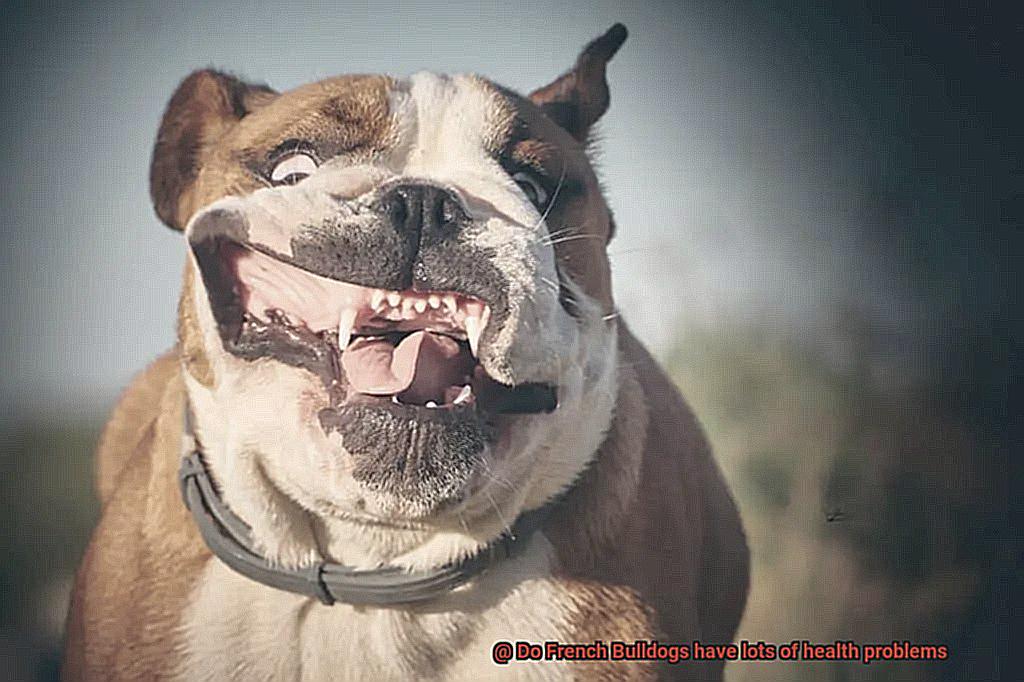
Knee Popping? It Might be Patellar Luxation.
Next on the list is patellar luxation, or as we like to call it, knee popping. This happens when your Frenchie’s kneecap decides it wants to go on a little adventure outside its normal position.
Your pup may experience pain and have difficulty straightening their leg. In more severe cases, surgery might be necessary to put things back in place.
Spinal Trouble: Introducing Intervertebral Disc Disease (IVDD).
Moving on to the spine, Frenchies can be prone to a condition called intervertebral disc disease (IVDD). Simply put, this means trouble for those spinal discs. They can degenerate or even rupture, putting pressure on the spinal cord and nerves. Yikes. Weakness, pain, and paralysis can result from IVDD. Your vet will guide you on the best course of action depending on the severity of the condition.
Wacky Spines: Say Hello to Hemivertebrae.
Now, let’s talk about something that sounds like a fancy word but is actually quite wacky – hemivertebrae. This congenital abnormality affects the shape of the vertebrae in your Frenchie’s spine, causing spinal deformities like scoliosis or kyphosis. Not only does this sound uncomfortable, but it can also lead to pain and mobility issues for your furry friend.
Elbow Dysplasia: A Tricky Joint Issue.
We’re not done yet. Elbow dysplasia is another orthopedic concern that Frenchies can face. This condition messes with the alignment and development of the elbow joint, resulting in pain, lameness, and limited range of motion. No fun for our little adventurers. Regular check-ups and weight management can help keep these joint problems in check.
Gastrointestinal Problems in French Bulldogs
We all know that these adorable squish-faced pups bring so much joy to our lives. But did you know that they can also be prone to some pesky gastrointestinal problems? In this article, we’ll dive into the common digestive issues that French Bulldogs may face and provide you with some paw-some tips to manage them effectively.
Flatulence: The Not-So-Pleasant Gas Passer
Oh là là. French Bulldogs are notorious for their stinky toots. Due to their unique brachycephalic skull shape, these pups tend to swallow more air than other breeds while chowing down on their kibble or slurping up water. This excessive gas can result in frequent episodes of flatulence, which can leave both you and your Frenchie feeling a little embarrassed. Combat this problem by:

- Feeding smaller, more frequent meals throughout the day.
- Avoiding foods that are known to cause gas, such as beans, broccoli, and cabbage.
- Adding probiotics to your Frenchie’s diet to promote healthy digestion.
Food Allergies: No More Tummy Troubles
Just like us humans, French Bulldogs can develop food allergies or sensitivities. These furry friends may experience tummy troubles like diarrhea, vomiting, or bloating when they consume ingredients they’re allergic to. To keep those sensitive tummies happy:
- Opt for a high-quality, grain-free diet that is tailored to your Frenchie’s needs.
- Avoid common allergens like dairy products, grains, and certain proteins.
- Consider an elimination diet under the guidance of your veterinarian to pinpoint any specific allergens.
GERD: Gastroesophageal Reflux Dog-gone Wrong
Say bonjour to GERD, a condition where stomach acid flows back into the esophagus, causing discomfort and irritation. French Bulldogs are more prone to this condition due to their unique anatomy. Keep an eye out for symptoms like regurgitation, excessive drooling, and difficulty swallowing. To ease the discomfort:

- Feed your Frenchie smaller, more frequent meals to prevent acid reflux.
- Elevate their food and water bowls to reduce the risk of reflux.
- Consult with your vet about medication options to manage GERD.
BOAS: The Breathing-Belly Connection
French Bulldogs are no strangers to respiratory issues, thanks to their adorable squished faces. These breathing difficulties can indirectly affect their gastrointestinal health, leading to problems like flatulence and even vomiting. Keep your Frenchie’s belly happy by:

- Avoiding strenuous exercise immediately after meals.
- Feeding your pup in a calm environment to minimize stress.
- Consulting with a veterinarian about surgical options to improve their breathing if necessary.

Genetic Conditions in French Bulldogs
French Bulldogs are undeniably adorable, but it’s important to be aware of the genetic conditions that commonly affect this breed. Irresponsible breeding practices have contributed to a higher risk of health issues in French Bulldogs.
In this article, we will explore the most prevalent genetic conditions seen in French Bulldogs and discuss their impact on the breed’s health.
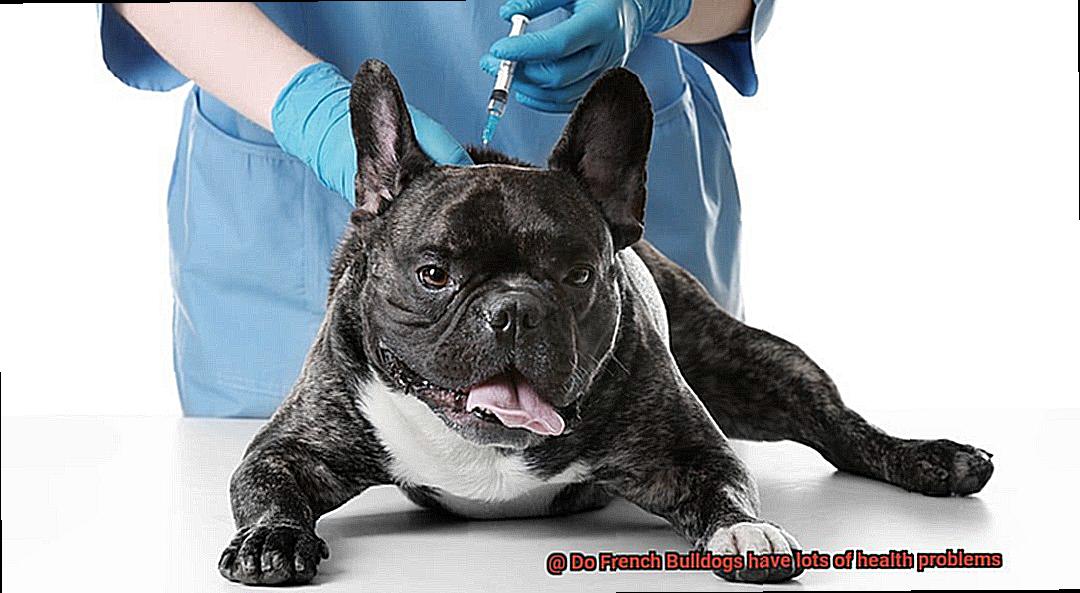
Brachycephalic Syndrome:
The distinctive short and flat face of French Bulldogs can lead to Brachycephalic Syndrome. This condition affects their respiratory system, causing breathing difficulties, snoring, and an increased susceptibility to heatstroke. Keep your Frenchie cool and avoid strenuous exercise during hot weather.
Intervertebral Disc Disease (IVDD):
French Bulldogs are prone to IVDD, a condition that affects the spinal discs. Symptoms may include pain, weakness, and even paralysis. Be mindful of their activities and avoid jumping or excessive rough play to reduce the risk of spinal injuries.
Allergies and Skin Conditions:

Itching, redness, hair loss, and recurrent ear infections are common signs of allergies and skin conditions in French Bulldogs. Regular grooming, a balanced diet, and avoiding irritants can help manage these issues effectively.
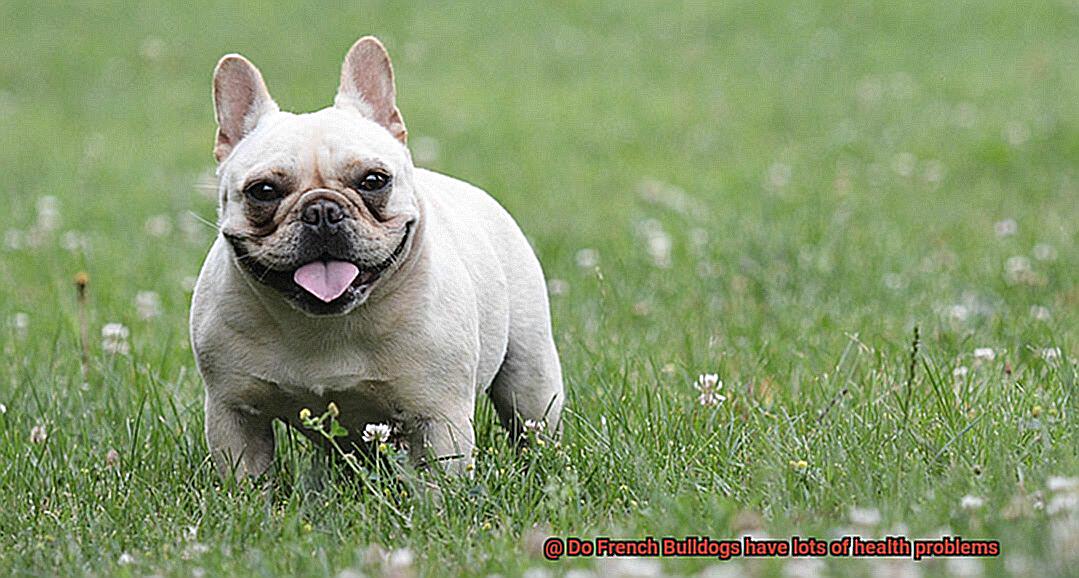
Orthopedic Issues:
Hip dysplasia and patellar luxation are orthopedic problems prevalent in French Bulldogs. These conditions can cause lameness, difficulty walking or running, and pain. Regular exercise on soft surfaces and maintaining a healthy weight can minimize the risk of these issues.
Eye Problems:
French Bulldogs are prone to various eye problems like cherry eye, corneal ulcers, and progressive retinal atrophy (PRA). Regular eye examinations by a veterinarian are essential to detect early signs of these conditions and prevent vision loss.
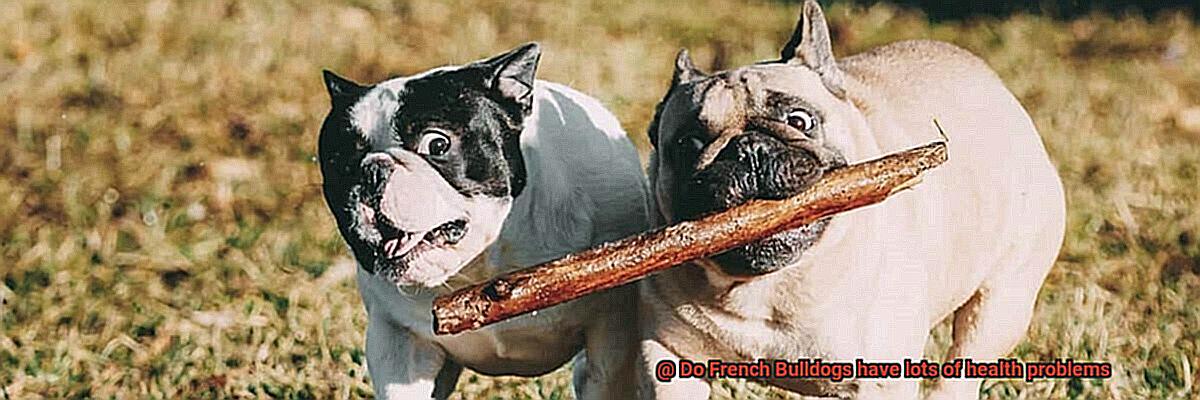
Cancer:
French Bulldogs have a higher risk of developing certain types of cancer, including mast cell tumors, lymphoma, and hemangiosarcoma. Regular screenings and early detection are crucial in managing these conditions effectively.
Conclusion:
Being aware of the genetic conditions commonly seen in French Bulldogs can help owners take preventive measures and ensure their furry companions live a healthy life. Regular veterinary check-ups, responsible breeding practices, proper nutrition, and exercise are key in minimizing the impact of these genetic conditions. By prioritizing health testing and ethical breeding practices, potential Frenchie owners can find reputable breeders who prioritize the well-being of their puppies. Remember, knowledge is power when it comes to keeping our beloved French Bulldogs happy and healthy.
Prevention and Management Strategies for French Bulldog Health Issues
From respiratory problems to skin conditions and genetic disorders, proactive prevention and effective management strategies can significantly improve your French Bulldog’s quality of life. In this article, we will explore practical tips and insights to help you keep your furry friend healthy and happy.
Brachycephalic Airway Syndrome:
Due to their unique facial structure, French Bulldogs are prone to respiratory difficulties. To prevent and manage this issue:
- Ensure your Frenchie has access to cool and well-ventilated spaces.
- Avoid strenuous exercise in hot weather.
- Monitor their breathing for any signs of distress, such as excessive panting or wheezing.
- Regularly clean their nose folds to prevent irritation and infection.
Obesity:
French Bulldogs have a tendency to gain weight easily, which can lead to joint problems and other health issues. To maintain a healthy weight:
- Provide a balanced diet recommended by your veterinarian.
- Monitor portion sizes and avoid overfeeding.
- Incorporate regular exercise into their routine, such as daily walks or playtime.
- Avoid giving excessive treats or table scraps.
Skin Issues:
French Bulldogs are prone to allergies, dry skin, and infections. To promote healthy skin:
- Regularly groom your Frenchie, including bathing with gentle shampoos suitable for their sensitive skin.
- Moisturize their skin with pet-friendly moisturizers or coconut oil.
- Keep the folds in their skin clean and dry to prevent bacterial or fungal infections.
- Use hypoallergenic bedding materials and avoid exposure to known allergens.
Eye Problems:
French Bulldogs are susceptible to various eye conditions. To ensure proper eye health:
- Schedule regular eye examinations with a veterinarian.
- Watch for signs of discomfort, redness, or excessive tearing in their eyes.
- Protect their eyes from potential injuries by avoiding rough play or exposure to irritants.
- Consider using specialized eye drops or ointments, as recommended by your vet.
Genetic Conditions:
While some genetic conditions cannot be completely prevented, you can manage their impact on your Frenchie’s well-being:
- Maintain a healthy weight to reduce the risk and severity of conditions like hip dysplasia and intervertebral disc disease.
- Provide appropriate joint supplements recommended by your veterinarian.
- Engage in regular exercise on soft surfaces to minimize strain on their joints.
- Be vigilant about responsible breeding practices and choose a reputable breeder.
Tips for Ensuring Optimal Health in Your French Bulldog
French Bulldogs are beloved companions known for their adorable appearance and friendly nature. However, they are also prone to certain health issues that owners should be aware of. By following these tips, you can help ensure optimal health and well-being for your French Bulldog.
Regular Veterinary Check-ups:
Taking your French Bulldog for regular veterinary check-ups is essential for detecting any potential health issues early on. Vaccinations, dental examinations, and overall physical assessments are crucial for maintaining their well-being. Your veterinarian can provide personalized advice and recommend any necessary treatments or interventions.
Proper Nutrition:
Providing a balanced and nutritious diet is key to your French Bulldog’s overall health. Choose high-quality dog food specifically formulated for their breed and age. Avoid feeding them table scraps or foods that are toxic to dogs, such as chocolate, onions, and grapes. Consult with your veterinarian to determine the best diet plan for your furry friend.
Regular Exercise:
French Bulldogs are prone to obesity, so regular exercise is vital to maintain a healthy weight. Daily walks, playtime, and interactive toys can help keep them physically active and mentally stimulated. However, it’s important to avoid overexertion due to their brachycephalic (flat-faced) anatomy.
Dental Care:
French Bulldogs are susceptible to dental problems like gum disease and tooth decay. Implementing a regular dental care routine, such as brushing their teeth or providing dental treats or toys, can help prevent these issues. Regular professional cleanings may also be necessary.
Grooming:
French Bulldogs have a short coat that requires regular grooming to keep it clean and healthy. Brushing their coat regularly helps remove loose hair and prevents matting. Additionally, cleaning their ears and trimming their nails should be part of their grooming routine.
E72_BsJAGtM” >
Conclusion
French Bulldogs are undeniably adorable and have become increasingly popular as pets.
However, it is important to acknowledge that they are prone to a multitude of health problems. From respiratory issues to skin allergies, these lovable pups often require extra care and attention.
Their short snouts can lead to breathing difficulties, making them susceptible to heat stroke and exercise intolerance. Additionally, their compact bodies make them more prone to spinal disorders and joint issues.
Eye problems such as cataracts and cherry eye are also common in French Bulldogs. It is crucial for potential owners to be aware of these health concerns and be prepared for the financial implications that come with frequent visits to the vet.
However, it is essential to prioritize their well-being by providing proper care, regular check-ups, and a safe environment.




